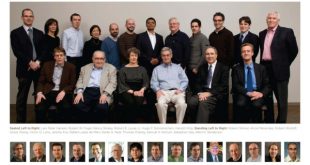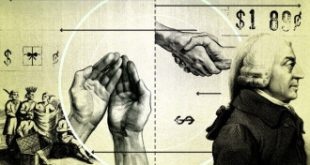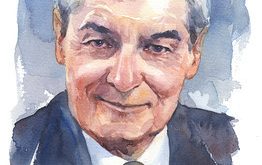Chicago style response to critique In a post up here earlier this week yours truly questioned the scientific value of Chicago economics. I took as an example the SMD theorem, that has unequivocally showed that there does not exist any condition by which assumptions on individuals would guarantee neither stability nor uniqueness of a general equilibrium solution — and that it, therefore, is intellectually dishonest to just go on pretending that it is still...
Read More »Georgescu-Roegen — the bioeconomic approach to climate change and growth
Georgescu-Roegen — the bioeconomic approach to climate change and growth Positivism does not seem to realize at all that the concept of verifiability — or that the position that ‘the meaning of a proposition is the method of its verification’ — is covered by a dialectical penumbra in spite of the apparent rigor of the sentences used in the argument … I hope the reader will not take offense at the unavoidable conclusion that most of the time all of us talk...
Read More »Teaching of economics — captured by a small and dangerous sect
Teaching of economics — captured by a small and dangerous sect The fallacy of composition basically consists of the false belief that the whole is nothing but the sum of its parts. In the society and in the economy this is arguably not the case. An adequate analysis of society and economy a fortiori can’t proceed by just adding up the acts and decisions of individuals. The whole is more than a sum of parts. This fact shows up when mainstream economics...
Read More »On the nature of money and debt
On the nature of money and debt Perhaps we may elucidate the distinction between money and money-of-account by saying that the money-of-account is the description or title and the money is the thing which answers to the description. Now if the same thing always answered to the same description, the distinction would have no practical interest. But if the thing can change, whilst the description remains the same, then the distinction can be highly...
Read More »The weird absence of money and finance in economic theory
The weird absence of money and finance in economic theory Consider the problem of money. Money is of central importance to any modern capitalist market economy. Yet it is mainly sociologists, philosophers and dissenters that have maintained an interest in what money “is” with a view to continued critique and development … One might think this is because economics has already provided an agreed clear concept of money. But this is not the case. Contemporary...
Read More »Chicago economics — a pseudo-scientific zombie
A couple of years ago, in a lecture on the US recession, Robert Lucas gave an outline of what the New Classical school of macroeconomics today thinks on the latest downturns in the US economy and its future prospects. Lucas starts by showing that real US GDP has grown at an average yearly rate of 3 per cent since 1870, with one big dip during the Depression of the 1930s and a big – but smaller – dip in the recent recession. After stating his view that the US recession that...
Read More »What is wrong with modern economics?
What is wrong with modern economics? It is simply that modern economists persist in insisting that a set of tools be everywhere adopted that are mostly inadequate to social analysis, given the nature of social phenomena … To put the matter bluntly (the pun may be useful), it is like attempting to cut the grass with a hammer or a piece of paper. The latter objects have their uses, but mowing the lawn is not one of them. Methods of applied mathematics of the...
Read More »Labor Complexity in Relation to Aggregate Marxian Value
Value, in Marxist theory, is an amount of abstract labor that is measured in hours of simple labor or a monetary equivalent. Marx argued that complex labor is reducible, for the purposes of commodity production and exchange, to amounts of simple labor. Qualitatively, complex and simple labor are the same. Both count as abstract labor, and so create value. But, quantitatively, complex labor creates value at a faster rate than simple labor. This distinction between simple and complex labor...
Read More »Hicks on probability calculus
Hicks on probability calculus To understand real world ‘non-routine’ decisions and unforeseeable changes in behaviour, ergodic probability distributions are of no avail. In a world full of genuine uncertainty — where real historical time rules the roost — the probabilities that ruled the past are not necessarily those that will rule the future. When we cannot accept that the observations, along the time-series available to us, are independent … we have, in...
Read More »Could Italy save the euro?
Could Italy save the euro? In a recent interview … Silvio Berlusconi mooted the introduction of a parallel domestic currency, the so-called mini-bills of Treasury (“mini-BOTs” for short), which would in theory allow Italy to exit austerity without exiting the eurozone. Italy’s Five Star/Lega coalition government has also embraced the idea. The ECB and the European Commission, predictably, oppose the mini-BOT’s introduction, seeing it as an existential...
Read More » Heterodox
Heterodox










